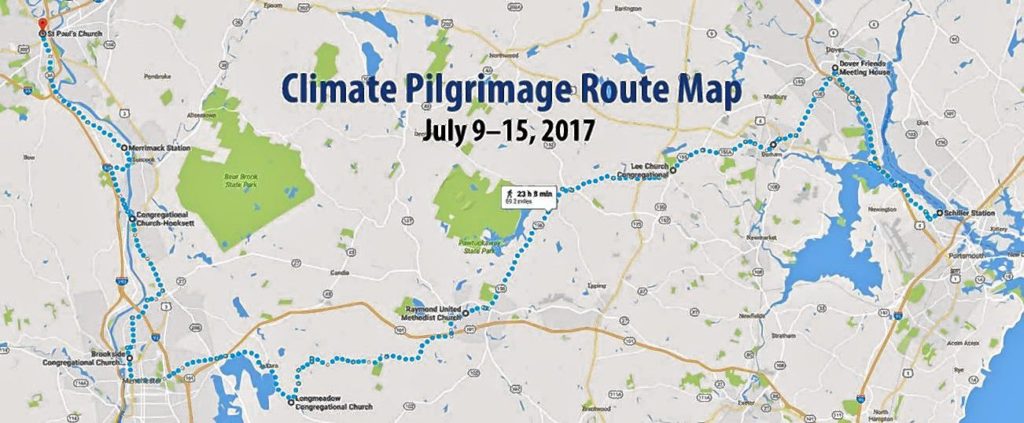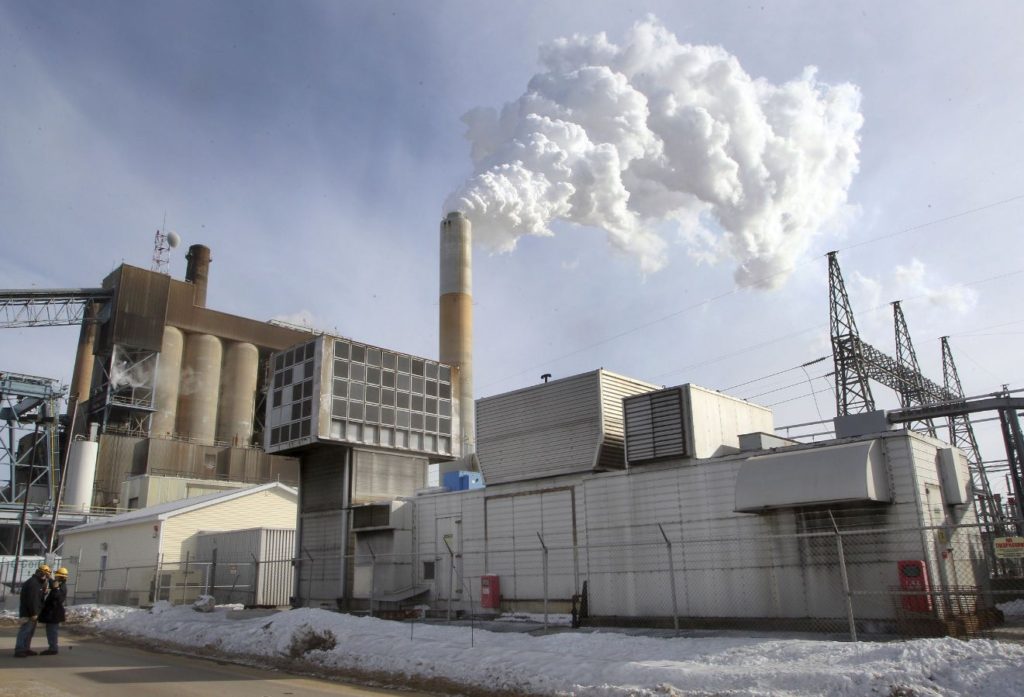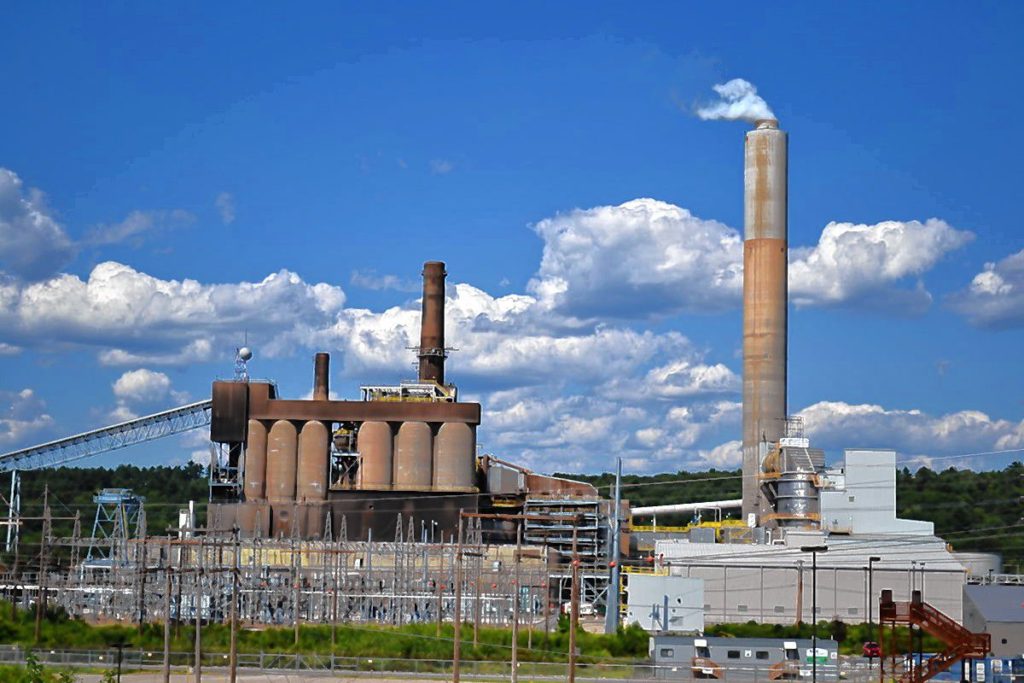A religious pilgrimage is taking place to oppose fossil fuel use in New England.
Members of the New England Yearly Meeting, a group made up of Quakers from the six New England states, plan to walk 60 to 70 miles the week of July 9 from Schiller Station power plant in Portsmouth, New Hampshire, to Merrimack Station in Bow, New Hampshire — two of the few remaining coal-powered plants in New England (Schiller also burns wood and other biomass).
Peter Blood, a Quaker who lives in Amherst — one of the co-writers of the popular Rise Up Singing songbook — is among those organizing the walk. He linked it to efforts of President Donald Trump to undermine climate efforts around the world — including backing out of the Paris Climate Accord.
“Trump is trying to ramp up coal production and use and is rolling back the things Obama did,” Blood said. “We kind of reflected on it and prayed together.”
Blood said that this walk — which will include some Quaker religious ceremonies, but is open to all — is a way to deepen participants’ commitment to the climate movement rather than an action designed to have a tangible effect — like closure of the plants.
Dirty, But Disappearing
Coal is among the least utilized energy sources in New England, according to Matt Kakley of Independent System Operator (ISO) New England, a nonprofit that oversees the region’s wholesale energy markets.
In 2016, coal represented just 2 percent if New England’s power supply compared with 18 percent in 2000. Oil likewise has plummeted — 2 percent in 2016 down from 22 percent in 2000.
But that doesn’t mean the region is moving away from fossil fuels. During the same period of time, natural gas has gone from 15 percent to 49 percent of the fuel mix, Kakley said.
Blood said he has felt religiously compelled to act by his Quaker faith; he wants to find a better way to live in the world without mistreating the poor, being involved in warfare, or destroying the planet.
“We want to mobilize churches, synagogues, Muslims, Buddhists, everyone to work together to show how our spirituality is differently oriented than the values of build, build, build; spend, spend, send,” he said.
Martin Murray, a spokesman for Eversource, the company that now owns both plants targeted by the walk, said the Quakers’ efforts were misplaced because coal is such a small contributor of pollution in New England. While the coal plants they are marching between used to be baseline plants — plants that were in operation at all times — they are now only used when needed. Generally, that’s during peak energy use times in winter and summer when natural gas can’t handle the load on its own, he said.
“There has to be some other source of electricity to keep the lights on, and what has been occurring for the last several years is oil and coal power plants are powered up at that time,” he said.
He added that a sulfur and mercury scrubber on the Merrimack Station plant has eliminated more than 80 percent of mercury and 90 percent of sulfur dioxide from plant emissions, according to Eversource.
“Coal is really a bit of a small player in terms of emissions of carbon, and Merrimack station is probably the cleanest coal power plant thanks to our customers’ investment in the scrubber system,” he said.
Murray suggested that a better subject for the group would be to support Eversource’s Northern Pass project, a 192-mile transmission line to bring 1,090 megawatts of Canadian hydropower to New Hampshire and southern New England. The project is currently being opposed by some New Hampshire groups due to perceived negative effects on the scenic views in northern New Hampshire. Murray said the completed project would reduce carbon emissions in New England by more than 3 million tons per year.
The Merrimack and Schiller stations are also for sale, and Eversource expects to sell them by early next year. Murray said that whoever buys the plants will have to continue burning coal for at least 18 months, but that after that it was up to the new owners what would be done with the plants.
The Call to Walk
Blood said that his group is not claiming this action will be the most effective one; it is simply what they feel called to do.
“This witness is not looking into the specifics of these plants, the specific use of the plant, that sort of thing,” he said. “We are walking to raise awareness to changes to our planet.”
Annie Patterson, Blood’s wife and co-author of the Rise Up Singing songbook, will also be participating in the walk.
Patterson, who grew up in Pennsylvania near Pittsburgh and went to school in West Virginia, said she knows and empathizes with people who make their living off of coal.
“In dealing with trying to transition a country out of using a resource that has provided an income to families who are desperate and sometimes just barely making it, my feeling is if there’s going to be a dialog about this, I want to bring in those families that have been struggling and dealing with trying to make a living,” she said.
Coal mining has supported some families for generations, she said. In remaking an economy that will work for all, those workers have to be part of the discussion rather than wealthy politicians, she said.
“We have to figure it out,” she said. “We can’t keep scraping the Earth. It just isn’t working.”
Sheila Garrett, of Putney, Vermont, also plans to be a part of the walk. She spent several months in 2015 walking to Georgia to talk to people about climate change.
“Quakers define the term ministry very broadly,” Garrett said. “I consider it to be ministry to walk and particularly to walk with an intention.”
Regarding her walk to Georgia, which started in Hartford, she said it was an amazing and wonderful experience, during which she spoke with many people and experienced a great deal of kindness.
She said that today, even just two years later, she is concerned that people are less friendly.
“It seems like the animosity and suspicion of other people has just grown and I don’t want to blame anybody for it; I think we’re all responsible,” she said.
At the same time, she feels hopeful about the New Hampshire walk. She said she is glad for the opportunity to talk to people she does not know about climate change.
“I’m hopeful because I feel like there’s a lot of really good energy and a lot of people are learning more about climate change and good stewardship and so forth,” she said.
Garrett said she doesn’t think Trump’s decision to pull out of the Paris Climate Accord reflects the will of most people in the country.
“I think we’re more informed and making wiser decisions on that, reflected in how many cities and states are going to comply with that agreement.,” she said.
Quaker Jay O’Hara is another organizer of the walk. He lives in China, Maine, but rose to climate change resistance notoriety through his work in Massachusetts, piloting a small boat called the Henry David T. to block a shipment of coal to the Brayton Point Coal Power Plant in Somerset with another activist — Ken Ward.
Since that time, O’Hara has also helped organize efforts to block train shipments of crude oil to Albany, New York, during which five protesters were arrested in a nearby suburb for physically blocking the trains.
He said he does his best to respond when called to act through his faith, especially through supporting people who take risks through civil disobedience.
“People ache because our lives are so out of joint with what we know to be true about the world,” he said. “Turning on a light switch and knowing the things we use and do every day are supported by an economic system that is destroying people and the life support system of the planet.”
O’Hara said the walk across New Hampshire is not a protest march with signs waving. It is a pilgrimage about introspection and asking how to proceed.
“The Quaker way, and what I take to be the Christian path, is about heeding the call of God and putting our faith and trust not in the institutions of this world, but in God’s power to make a way out of no way,” he said.
For more information on the walk, visit climatepilgrimage.org.
You can reach Dave Eisenstadter at deisen@valleyadvocate.com.





